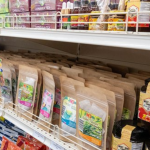In the face of climate change, Guyana embarked on a remarkable journey in 2020 to revitalise its agriculture sector.
These efforts have yielded significant results, mainly increasing local food production nationwide, and reducing the country’s food import bill by 14 per cent between 2021 and 2022.
This was revealed by Minister of Agriculture, Zulfikar Mustapha, during an interview with the Department of Public Information (DPI) on the sidelines of the 46th Regular Meeting of the Conference of Heads of Government of CARICOM, at the Marriott Hotel in Georgetown, on Monday.

“We have prioritised several high-import commodities. Commodities that need a lot of funds to import…From 2021 to 2022, we were able to reduce imports by 14 per cent,” Minister Mustapha stated.
He remains confident that Guyana’s food import bill will decrease further, due to the slew of initiatives being undertaken.
‘That tells us that we are doing something good because we are reducing the food import bill. We are producing now to substitute all those foods that we used to import,” he stated.

The initiatives being undertaken include the production of spices, high-value crops, corn and soya beans production, brackish water shrimp, artificial insemination (AI) in cattle, breeding animals, millet cultivation, and the cultivation of bio-fortified rice, among others.
Only recently, His Excellency, Dr Mohamed Irfaan Ali announced that by the end of 2024, Guyana will become self-sufficient in the production of red beans and black-eye peas and will be able to supply all of CARICOM’s needs with these commodities by 2025.

Guyana is also on target for self-sufficiency in the production of corn and soya beans by 2025.
By 2027, the country will be able to produce enough of these commodities to meet the region’s demands.
Minister Mustapha reaffirmed, “We are talking about 25 per cent of US$6 billion annually and how much money will remain in the region to do other things.”
Guyana achieved 82 per cent of its food production target last year, while Barbados achieved 94 per cent of its target.






